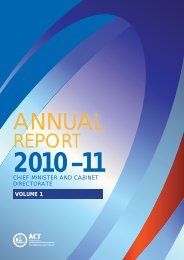Probation Policy - Chief Minister and Treasury Directorate
Probation Policy - Chief Minister and Treasury Directorate
Probation Policy - Chief Minister and Treasury Directorate
Create successful ePaper yourself
Turn your PDF publications into a flip-book with our unique Google optimized e-Paper software.
7. For managers investing time <strong>and</strong> resources in the assessment of performanceduring an officer’s probation period can deliver longer term benefits for theagency, by:• providing a fair <strong>and</strong> transparent process;• limiting the risks associated with poor recruitment decisions;• improving the quality of management through the provision of clearjob expectations, continuing guidance, feedback, formal reviews <strong>and</strong>support; <strong>and</strong>• ensuring that new officers are engaged <strong>and</strong> appropriately inductedinto an agency.8. <strong>Probation</strong> provides an opportunity for new officers to determine whether or notthe position meets their expectations <strong>and</strong> requirements.9. It is therefore in the interest of the Agency <strong>and</strong> the officer on probation that therequirements of this policy are applied properly.Principles10. The following principles apply to the probation process:10. 1 the probation process is recognised as an important component of theappointment process;10. 2 the probation period is a defined period of time during which a newofficer’s performance is subject to formal review;10. 3 during the probation period, new officers must be provided with clearjob expectations, continuing guidance, feedback, formal reviews <strong>and</strong>support;10. 4 the probation period enables the suitability of an officer on probationsuitability for employment in the ACTPS, conduct, work performance<strong>and</strong> behaviour to be assessed; <strong>and</strong>10. 5 if deficiencies are identified in an officer on probation’s conduct, workperformance or behaviour during the probation period corrective actionshould be undertaken including relevant staff development <strong>and</strong>training.Specific Matters<strong>Probation</strong> – Notice of Engagement11. Agencies must inform each officer on probation in writing, at the time ofengagement, of the terms of their appointment, including:11. 1 the type of employment;11. 2 whether a probationary period applies;11. 3 the expected duration of the probationary period;11. 4 that the probationary period may be extended;11. 5 the maximum period of extension; <strong>and</strong>
17.2 whether the purpose of probation is to provide a period of training forthe officer on probation <strong>and</strong> to allow an assessment to be made of theofficer on probation’s aptitude <strong>and</strong> capacity to do the work, oncetrained;17.3 the officer on probation’s previous experience, including training; <strong>and</strong>17.4. situations that may occur during the course of the probationary periodfor example, an extended period of leave or an extended st<strong>and</strong>ownperiod.Extension of <strong>Probation</strong>18. The PSM Act provides for a maximum period of probation of twelve months.19. A decision to extend a probationary period may be taken, provided:19. 1 that the possibility of extension, including the maximum period ofextension was included in the officer’s original letter of offer; <strong>and</strong>19. 2 the officer on probation’s performance, or conduct, has not met thest<strong>and</strong>ards outlined at the commencement of employment; <strong>and</strong>19. 3 the agency has decided not to terminate the appointment.20. If an officer on probation is not advised that their probation will beextended prior to the end of the initial period of probation the period ofprobation cannot be extended. The officer on probation’s appointmentwill need to be either confirmed or terminated in this case.21. In addition to reasons of performance additional grounds for extension mayinclude:21. 1 excessive leave during the probation period; or21. 2 factors beyond the officer on probation’s control which have hinderedthe ability to adequately assess the officer on probation during theprobation period (e.g. disruption to work or personal circumstances).22. Where a probationary period is to be extended the officer on probation mustbe advised in writing:22. 1 of the extension;22. 2 of the new period of probation;22. 3 of the reasons for extension; <strong>and</strong>22. 4 that, if the performance st<strong>and</strong>ards are not met, the probationer’semployment may be terminated.23. In the event of an extension, it is crucial that continuous follow-up takesplace <strong>and</strong> vigorous reporting <strong>and</strong> training/development is provided (whererelevant dependent on the circumstances of the extension).
24. The chief executive must notify Shared Services, Recruitment Services, inwriting of any extension to a probation period.Temporary Transfer <strong>and</strong> Higher Duties Allowance during probation25. Offers of temporary transfer, whether involving Higher Duties Allowance(HDA) or not for officers on probation during the probation period should beconsidered carefully. Before approving a temporary transfer the relevantchief executive should consider whether a fair <strong>and</strong> reasonable assessmentof the officer on probation can be made against the duties of the position towhich they were appointed, how any remaining probation period is to beassessed <strong>and</strong> by whom.End of probation - Where the appointment is to be confirmed26. Confirmation of an appointment will be made at the end of the probationperiod on the basis that the officer on probation has:26. 1 passed a medical examination;26. 2 a satisfactory attendance record;26. 3 been assessed <strong>and</strong> their performance is determined to be satisfactoryagainst the duties of the position they have been appointed to; <strong>and</strong>26. 4 been assessed as a fit <strong>and</strong> proper person to remain an officer of theservice on the basis of satisfactory criminal history record check <strong>and</strong>proper behaviours which comply with section 9 of the PSM Act.27. Following the chief executive’s formal notice of confirmation of theappointment, managers must ensure that the original of the final probationreport is sent to Shared Services, Recruitment Services <strong>and</strong> that a copy ofthe final probation report is provided to the new appointee. Shared Services,Recruitment Services will forward a formal notice of confirmation ofappointment to the new appointee after receiving the final probation report.End of probation - Where the appointment is to be terminated28. An appointment may be terminated by the relevant chief executive at anytime before the appointment has been confirmed. Any such termination mustbe implemented in a manner that is consistent with the principles ofprocedural fairness. The relevant chief executive should terminate theappointment on the grounds that they:28. 1 are not satisfied, after receiving a report from an authorised medicalpractitioner, as to the officer on probation’s health <strong>and</strong> fitness; or28. 2 consider, after receiving a report from the officer on probation’smanager or another appropriate staff member, that performance of theofficer on probation’s duties has not been satisfactory; or28. 3 consider that the officer on probation is not a fit <strong>and</strong> proper person toremain an officer of the service on the basis of his or her criminal
history record check or other behaviours which do not comply withsection 9 of the PSM Act; or28. 4 are satisfied that the officer on probation is an excess officer.29. The officer on probation must have been adequately counselled regardinghis or her poor performance <strong>and</strong> given the opportunity to respond to anyrecommendation to terminate his or her appointment.30. The officer on probation must be given at least fourteen (14) calendar dayswritten notice of any decision to terminate the officer’s on probationappointment during the probation period.31. An officer on probation (or their union/representative) can seek a review ofany actions or decisions taken by the agency in relation to his or heremployment during the period of probation under the internal review processof their Agency Agreement. However, it is not open to an officer on probationto seek an internal review of a decision by an agency to terminate his or herappointment on probation or a review of the process leading to any suchdecision.32. The timing of any decision to terminate the appointment of an officer onprobation (whatever the duration of the probation) may have implications forthe Agency <strong>and</strong> for the officer due to the requirements of the unfair dismissalprovisions of the Fair Work Act 2009 (FW Act). If a notice of termination ofthe appointment is given to the officer on probation within 6 months of thedate of appointment, then the officer would not be eligible to make a claimfor unfair dismissal to Fair Work Australia (FWA). However, if a notice oftermination of the appointment is not given to the officer within 6 months ofthe date of appointment, then the officer would be eligible to make a claimfor unfair dismissal to FWA. It is therefore in the interests of the Agency toensure that any action to terminate the appointment of an officer onprobation is consistent with the principles of procedural fairness <strong>and</strong> that therequirements of this policy are strictly followed. This will be particularlyimportant for any decision to terminate the appointment of an officer onprobation that is made more the 6 months after the officer’s appointment.The PSM Act provides that if an officer’s appointment on probation has beenneither confirmed nor terminated after 12 months, from the date of theappointment, the chief executive must either confirm the appointment orterminate it.33. An officer on probation whose appointment has been terminated is noteligible for reappointment to the service within a period of 12 monthsimmediately following termination. However, in accordance with the PSMAct, the Commissioner for Public Administration may, following a request<strong>and</strong> after considering all the circumstances, determine that a person can beappointed within the 12 month period.
Specific Responsibilities include:Agencies roles <strong>and</strong> responsibilities (Agency responsibilities are carried out by thechief executive or a person delegated to exercise the power)34. Agencies have specific responsibilities in managing the period of probationincluding:35. 1 informing the officer on probation, at the time of appointment, of what isnecessary for their appointment to be confirmed (letter of offer);35. 2 advising the officer on probation, during the probationary period of theirwork responsibilities, the required st<strong>and</strong>ards of work <strong>and</strong> the st<strong>and</strong>ardof conduct expected. This process should be recorded in writing,especially where there is an intention to extend the probationary periodor terminate the appointed;35. 3 managing the probation process, including providing the officer onprobation with a copy of this policy, arranging delegate approvals,assessments, completing reports, determining extensions <strong>and</strong>/ortermination of appointment, in line with ACTPS legislativerequirements;35. 4 ensuring they have the appropriate delegation to sign off <strong>and</strong> managethe probationary process – see agency delegations <strong>and</strong> AgencyAgreement;35. 5 conducting assessments, in consultation with the officer on probation,in an open, honest <strong>and</strong> constructive manner that provides both thedelegate <strong>and</strong> officer on probation with an opportunity to discuss theofficer on probation’s conduct <strong>and</strong> performance against the st<strong>and</strong>ardsprovided at the commencement of employment;35. 6 conducting at least two formal assessments, at least eight weeks apart,of an officer on probation during the probationary period;35. 7 advising the officer on probation of the process by which he or she willbe informed of assessment procedures, including that he or she willhave an opportunity to respond to assessment reports;35. 8 ensuring that where the officer on probation’s performance isconsidered to be less than satisfactory, agree on a reasonable plan toassist the officer on probation to achieve the required performancest<strong>and</strong>ards during the remaining probationary period. This plan mustthen be documented in the probation report;35. 9 providing the officer on probation with a copy of the probation reportwith an opportunity for the officer on probation to respond within sevenworking days. The officer on probation should be asked to read <strong>and</strong>sign the report: this signature is an acknowledgement that the officer onprobation has seen the report, not of their agreement with its contents.The officer on probation may provide comments on the probation reportor their own statement in relation to the report if he or she wishes to doso;35. 10 providing support to the officer on probation, as well as exercising therole of assessor. Specific on-the-job training or developmentopportunities must be provided by the workplace to help the officer onprobation perform in his or her job;
35. 11 providing regular feedback to the officer on probation. Regularlymonitoring the performance of the officer on probation <strong>and</strong> givingregular feedback provides the opportunity for the officer on probation torectify any performance problems during the probation period;35. 12 providing the necessary advice to Shared Services, RecruitmentServices at different stages of the probationary process;35. 13 in the event that an agency intends to extend a period of probation foran officer on probation the agency must ensure that such advice isprovided to Shared Services, Recruitment Services, with sufficienttime to enable the relevant administrative processes to be completedbefore the end of the probationary period; <strong>and</strong>35. 14 in the event that an agency intends to terminate the appointment ofan officer on probation, prepare formal notification of termination ofemployment for the officer on probation <strong>and</strong> provide counselling <strong>and</strong>feedback as appropriate.Officer on probation responsibilities:36. The officer on probation:36. 1 must participate in the probationary process;36. 2 must read <strong>and</strong> sign a copy of the probation report, when asked to doso by the chief executive, within seven working days. The probationermay provide comments on the probation report or attach their ownstatement in relation to the report if they wish to do so; <strong>and</strong>36. 3 must inform the chief executive if there are any factors beyond theofficer on probation’s control which may affect the ability of the chiefexecutive to adequately assess their performance during theprobationary period;Shared Services role <strong>and</strong> responsibilities:37. Shared Services have specific role <strong>and</strong> responsibility in assisting with themanagement of the period of probation including:37. 1 preparing letter of offer of appointment to the ACTPS incorporatingprobation period <strong>and</strong> extension period based on the PSM Act, AgencyAgreements <strong>and</strong> advice from agencies for non-st<strong>and</strong>ard probationarrangements;37. 2 sending a probation report template to the agency as part of theofficer’s commencement process;37. 3 preparing <strong>and</strong> sending confirmation/extension of appointment letters;37. 4 checking that all pre-appointment requirements have been completedon receipt of the final probation report. (Where it is identified that theprobationer has not completed all pre-appointment requirements theprobation cannot be confirmed or taken to be confirmed until such timeas the pre-appointment requirements have been completed. In thiscase the probationer, the chief executive <strong>and</strong> the Agency HR area willbe notified immediately); <strong>and</strong>37. 5 reporting to agencies on their management of probation.
Legislative Reference38. Legislative references include:• Fair Work Act 2009;• Fair Work Regulations 2009;• Agency Enterprise Agreements;• ACT Public Sector Management Act 1994;• ACT Public Sector Management St<strong>and</strong>ards (subordinate law); <strong>and</strong>• Territory Records Act 2002.Dictionary<strong>Chief</strong> Executive:Means the chief executive of the relevant administrative unit or a person or officeauthorised to exercise a function or power of the chief executive through aninstrument of delegation.Related <strong>Policy</strong>39. Related <strong>Policy</strong> may include:• any relevant Agency <strong>Probation</strong> Policies, Guidelines <strong>and</strong> Fact Sheets<strong>Policy</strong> OwnerSenior ManagerStrategic Human ResourcesPublic Sector Management GroupGovernance Division<strong>Chief</strong> <strong>Minister</strong>’s DepartmentReview Date40. This policy statement is due for review in December 2012.Catherine HudsonCommissioner for Public Administration18 November 2010Document Name: <strong>Probation</strong> <strong>Policy</strong>Prepared by: Senior Manager, Public Sector ManagementVersion: Number 1Feedback to: psm@act.gov.auIssue Date: 18 November 2010


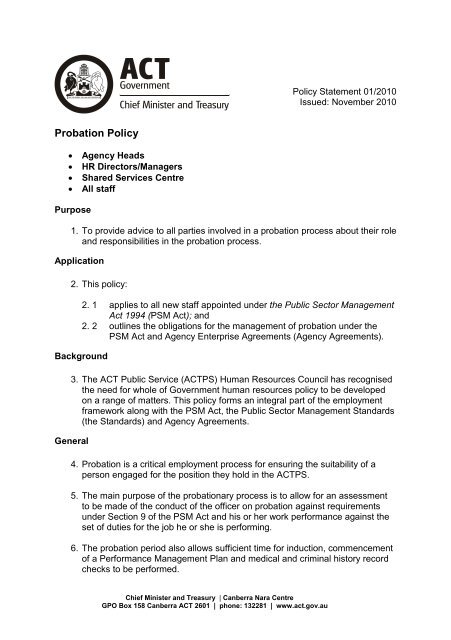
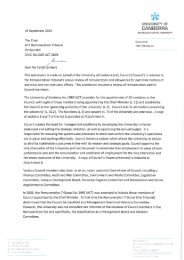
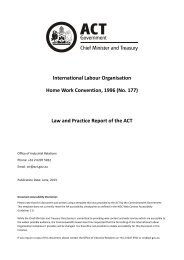
![HSR Training Programs Guidelines [ PDF 191KB]](https://img.yumpu.com/51348280/1/190x245/hsr-training-programs-guidelines-pdf-191kb.jpg?quality=85)


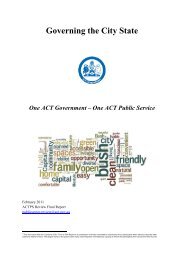
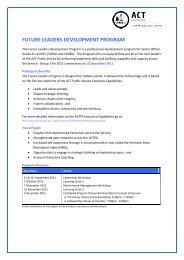

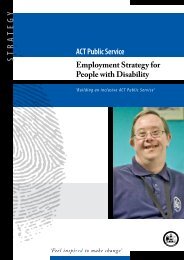
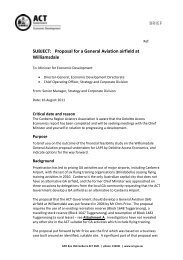
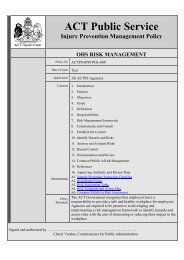
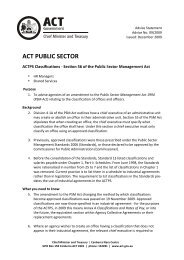
![Teachers Technical and Further Education [ PDF 68KB]](https://img.yumpu.com/34230751/1/184x260/teachers-technical-and-further-education-pdf-68kb.jpg?quality=85)
